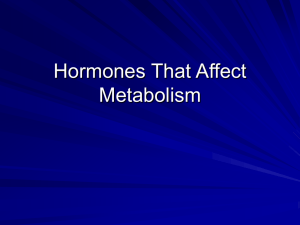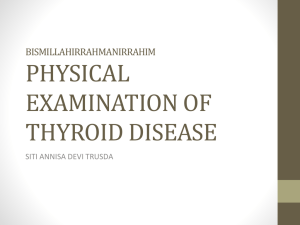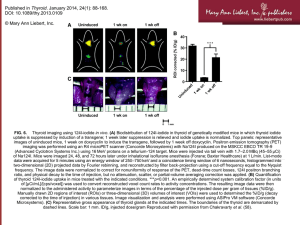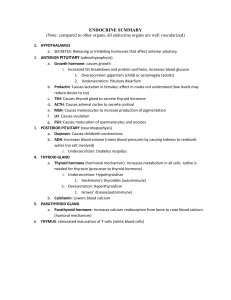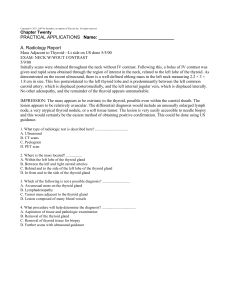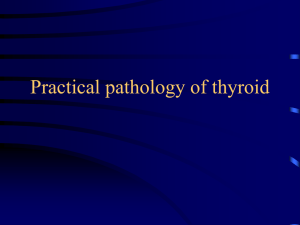File - Middlesex Surgical Associates
advertisement
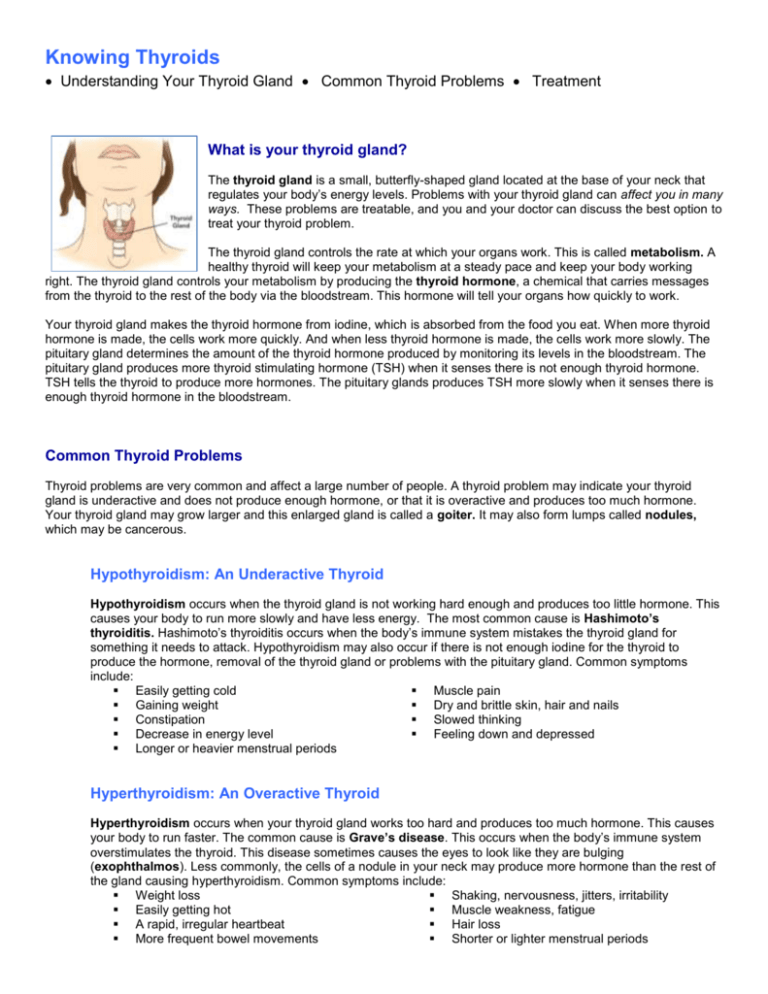
Knowing Thyroids Understanding Your Thyroid Gland Common Thyroid Problems Treatment What is your thyroid gland? The thyroid gland is a small, butterfly-shaped gland located at the base of your neck that regulates your body’s energy levels. Problems with your thyroid gland can affect you in many ways. These problems are treatable, and you and your doctor can discuss the best option to treat your thyroid problem. The thyroid gland controls the rate at which your organs work. This is called metabolism. A healthy thyroid will keep your metabolism at a steady pace and keep your body working right. The thyroid gland controls your metabolism by producing the thyroid hormone, a chemical that carries messages from the thyroid to the rest of the body via the bloodstream. This hormone will tell your organs how quickly to work. Your thyroid gland makes the thyroid hormone from iodine, which is absorbed from the food you eat. When more thyroid hormone is made, the cells work more quickly. And when less thyroid hormone is made, the cells work more slowly. The pituitary gland determines the amount of the thyroid hormone produced by monitoring its levels in the bloodstream. The pituitary gland produces more thyroid stimulating hormone (TSH) when it senses there is not enough thyroid hormone. TSH tells the thyroid to produce more hormones. The pituitary glands produces TSH more slowly when it senses there is enough thyroid hormone in the bloodstream. Common Thyroid Problems Thyroid problems are very common and affect a large number of people. A thyroid problem may indicate your thyroid gland is underactive and does not produce enough hormone, or that it is overactive and produces too much hormone. Your thyroid gland may grow larger and this enlarged gland is called a goiter. It may also form lumps called nodules, which may be cancerous. Hypothyroidism: An Underactive Thyroid Hypothyroidism occurs when the thyroid gland is not working hard enough and produces too little hormone. This causes your body to run more slowly and have less energy. The most common cause is Hashimoto’s thyroiditis. Hashimoto’s thyroiditis occurs when the body’s immune system mistakes the thyroid gland for something it needs to attack. Hypothyroidism may also occur if there is not enough iodine for the thyroid to produce the hormone, removal of the thyroid gland or problems with the pituitary gland. Common symptoms include: Easily getting cold Muscle pain Gaining weight Dry and brittle skin, hair and nails Constipation Slowed thinking Decrease in energy level Feeling down and depressed Longer or heavier menstrual periods Hyperthyroidism: An Overactive Thyroid Hyperthyroidism occurs when your thyroid gland works too hard and produces too much hormone. This causes your body to run faster. The common cause is Grave’s disease. This occurs when the body’s immune system overstimulates the thyroid. This disease sometimes causes the eyes to look like they are bulging (exophthalmos). Less commonly, the cells of a nodule in your neck may produce more hormone than the rest of the gland causing hyperthyroidism. Common symptoms include: Weight loss Shaking, nervousness, jitters, irritability Easily getting hot Muscle weakness, fatigue A rapid, irregular heartbeat Hair loss More frequent bowel movements Shorter or lighter menstrual periods Thyroid Nodules The thyroid gland may develop small lumps, called nodules. Despite forming nodules, your thyroid gland will often continue to function at a normal pace. There are no known direct causes of thyroid nodules, but they are more common in people who have experience therapeutic radiation to the head or neck for problems such as acne or swollen tonsils. You may not notice any symptoms but you may be able to feel the nodule in your neck. For the most part, nodules are harmless, but occasionally they are cancerous. Goiters A goiter is an enlarged thyroid gland. Thus may cause visible swelling on one or both sides of your neck. Hypothyroidism may cause a goiter because the thyroid may enlarge in order to produce more hormone. Hyperthyroidism may cause a goiter because thyroid cells may multiply too fast and cause the thyroid to grow. Development of multiple nodules may cause the thyroid to grow as well. Problems with the thyroid gland are easily treatable, and most forms of thyroid cancer can be stopped. You and your doctor can discuss your best treatment options, and this may include medications, thyroid hormone pills, surgery and other procedures. What test will I need? In order to determine your best treatment plan, your doctor will perform an evaluation. This will include a patient history and exam. Your doctor will ask questions about your symptoms and medical history to rule out alternative causes. Be sure to clearly describe your symptoms. Because thyroid problems can be hereditary, your doctor may also ask if other family members have had thyroid problems. During your physical exam, your doctor will look at your neck and thyroid gland to check for growth, nodules or other changes. He or she may check your blood pressure, weight, and pulse rate and examine your eyes and skin as well. In addition, test and procedures may be performed to determine what thyroid problem you have and it cause. A blood test can tell if your thyroid is underworking or overworking by measuring the amount of thyroid hormone and TSH in your blood. A radioiodine uptake test measures how well your thyroid absorbs iodine. You will ingest a small amount of mildly radioactive iodine. Hours later and the next day, a machine will measure the amount of radioactive iodine in your thyroid. A thyroid scan and an ultrasound exam will create images of the thyroid gland which helps your doctor access nodules. If you doctor finds nodules, he or she may order a fine-needle aspiration biopsy to determine whether the nodule is cancerous. Using ultrasound, a specialist will numb the area and use to fine needle to collect cells from the nodule. The cells will be further examined. Treatment After determining your thyroid problem and its causes, your doctor can create a plan to treat it. Your doctor may prescribe thyroid hormone pills or medications. Nodules may be closely monitored or removed. The thyroid gland might be destroyed with radioactive iodine (radioiodine ablation) or removed in surgery (thyroidectomy). Treating Hypothyroidism To treat your hypothyroidism, your doctor may prescribe thyroid hormone pills. Your symptoms should begin to clear up, and an enlarged thyroid gland should return to normal size after beginning thyroid hormones. In order to maintain the normal thyroid hormone level, you will probably need to take thyroid hormone pills for the rest of your life. Your doctor will need to regularly monitor your thyroid hormone level in your blood in order to maintain the correct dosage and make any adjustments if necessary. Treating Hyperthyroidism Hyperthyroidism can be treated using several different methods. You doctor may prescribe medications to slow the production of thyroid hormone in order to maintain normal levels. If the medication does not work, your doctor may administer radioiodine ablation of the thyroid, or destroying the thyroid gland by giving you a large dose of radioactive iodine in pill or liquid form to kill thyroid cells. Or, your doctor might remove your thyroid gland surgically (thyroidectomy). You may need to take thyroid hormone pills to maintain normal hormone levels for treatment. Treating Nodules and Goiters If you have noncancerous nodules, your doctor may prescribe thyroid hormone pills to prevent the nodules from growing larger. You doctor can check the nodules for size change by performing a physical exam or using ultrasound. If the nodules grow to be very large, cause difficulty breathing or swallowing, or are cancerous, your doctor will perform a thyroidectomy. Radioiodine ablation may be done after surgery to ensure all cancerous tissue has been destroyed. A goiter may be surgically removed if it does not get smaller after treatment. After surgery, you may need to take thyroid hormone pills to maintain normal hormone levels. If you need surgery The best way to treat your thyroid problem may be by removing all or part of your thyroid gland. Your doctor can explain the procedure with you. A complete physical exam may be necessary before your surgery, which may include a routine check of your blood and your heart and an x-ray of your chest. Surgery can be performed to remove a large goiter or nodule, a hyperthyroid gland that medication cannot control, or a cancerous thyroid gland. The amount of gland removed depends on several factors which your surgeon can discuss with you. Your Surgical Procedure An Intravenous (IV) line provides you with fluids and medications during the surgery. You will be administered general anesthesia so you will be asleep during the procedure. In your neck, along the crease of your skin, and incision is made. The surgeon may remove half of the thyroid gland (lobectomy), most of the gland (subtotal thyroidectomy), or the entire gland (total thyroidectomy). Sometimes, the surgeon can only decide how much of the thyroid needs to be removed once he or she has made an incision and can examine the area around the thyroid. When the surgical procedure is finished, the incision is closed using surgical strips, surgical slips or sutures. A drain may be left in the incision to remove fluid. After Your Surgical Procedure The evening after the procedure you can usually begin to eat and drink normally. You may be administered pain medication the first day or so, but discomfort is usually minimal. You may experience a sore throat or hoarseness in the first week after surgery. During your hospital stay, you will be monitored for bleeding and to make sure your parathyroid glands are working properly. If the stress of the surgery stuns these glands, you may be given calcium supplements. When to Call Your Doctor If you notice any of these signs, call your doctor right away. Swelling or bleeding at the incision site Signs of infections- Warmth, fever, or tenderness A sore throat that continues beyond three weeks Tingling or cramps in the hands, feet or lips (signs of a problems with the parathyroid glands) to maintain normal hormone levels


